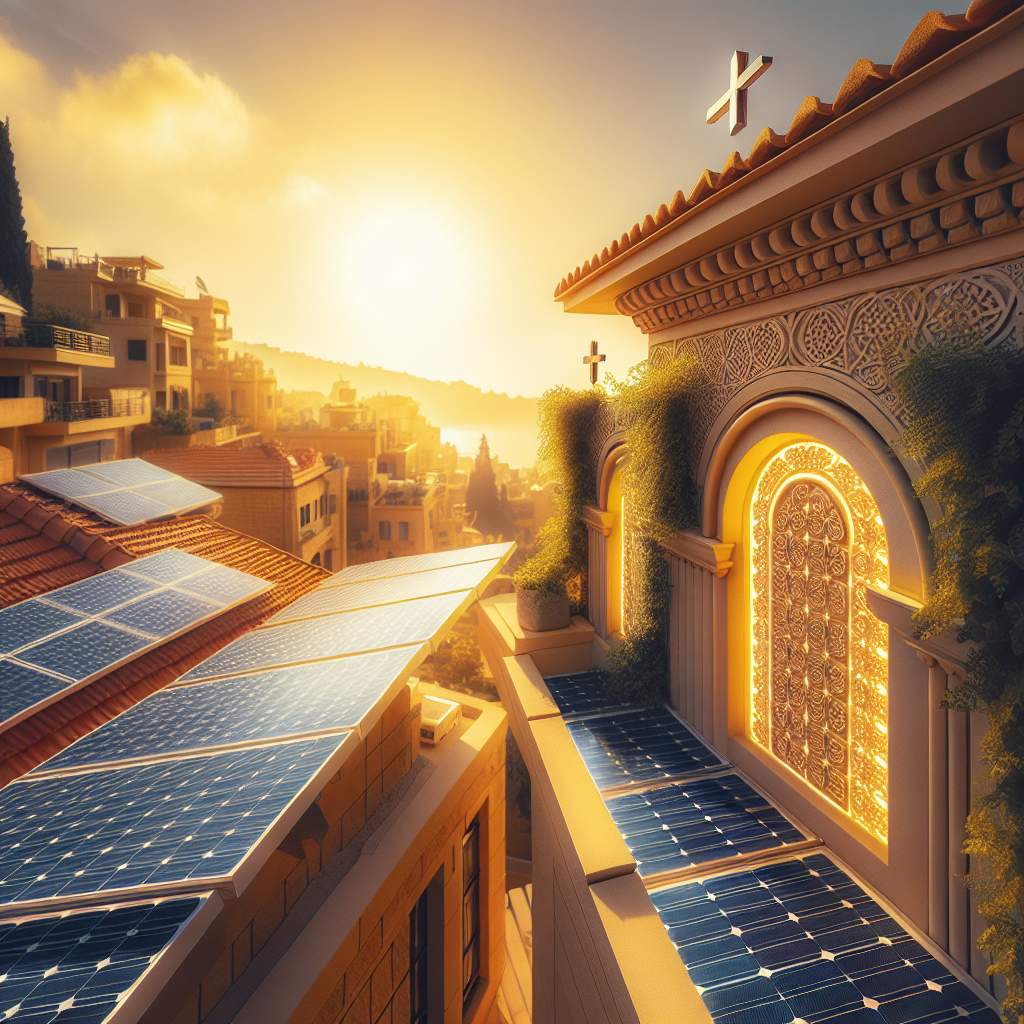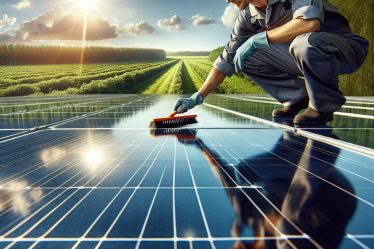
Hey there, sun-seekers! Ready to dive into the enlightening world of solar energy in Lebanon? Buckle up as we explore the dazzling benefits of embracing the power of the sun. From slashing those hefty energy bills to reducing carbon footprints, solar energy is a game-changer. But that’s not all – we’ll uncover how it empowers communities and sparks economic growth. With the government offering sweet incentives and tech wizardry making huge strides, Lebanon is on the cusp of a solar revolution. Soak up some rays and get ready for a sunny journey through the wonders of solar power!
Introduction to Solar Energy in Lebanon
Lebanon, a country blessed with abundant sunshine, is increasingly turning to solar energy as an efficient and sustainable power source. Solar energy harnesses sunlight to generate electricity through the use of photovoltaic panels, allowing homes and businesses to reduce their reliance on traditional fossil fuels. The adoption of solar energy in Lebanon presents a myriad of benefits, including cost savings on electricity bills, reduced environmental impact by lowering carbon emissions, and greater energy independence for the nation.
One of the key advantages of solar power in Lebanon is its potential to provide a more stable and reliable source of electricity. By leveraging the abundant sunlight available throughout the year, communities can mitigate the impacts of frequent power outages while contributing to a more resilient energy infrastructure. Additionally, investing in solar energy supports job creation and economic growth within the renewable energy sector, fostering local expertise and technological advancement.
Embracing solar energy aligns with Lebanon’s commitment to sustainability and environmental responsibility. By transitioning towards clean energy sources such as solar power, Lebanon can reduce its carbon footprint and contribute to global efforts in combating climate change. This shift not only enhances air quality but also promotes healthier living conditions for citizens across the country.
Current Energy Challenges in Lebanon
Lebanon is facing serious energy challenges, with frequent power cuts and a heavy reliance on expensive imported fuel. This not only affects households but also hampers businesses and the overall economy. The country’s energy sector struggles to meet the increasing demand, leading to environmental concerns and high electricity bills for consumers.
Amid these challenges, solar energy emerges as a promising solution for Lebanon. With abundant sunshine throughout the year, solar power presents an opportunity to diversify the country’s energy mix and reduce its dependence on costly imports. By harnessing solar energy, Lebanon can mitigate power outages, lower carbon emissions, and create a more sustainable future for its citizens.
Investing in solar energy can drive job creation and technological advancement in Lebanon’s renewable sector. Transitioning towards solar power aligns with the nation’s commitment to promoting clean energy and combating climate change while fostering economic growth and stability.
Environmental Benefits of Solar Energy
Solar energy is a clean, renewable source of power that has a positive impact on the environment. Reduced Air Pollution: Solar panels produce electricity without emitting harmful greenhouse gases, helping to improve air quality and reduce the impact of climate change. Conservation of Natural Resources: By harnessing sunlight to generate electricity, solar energy helps in preserving natural resources like coal, oil, and natural gas. This reduces the need for destructive mining and drilling activities. Wildlife Protection: Unlike traditional power plants that can harm wildlife through pollution and habitat destruction, solar energy systems have minimal impact on ecosystems.
Additionally, solar energy plays a crucial role in mitigating water scarcity. Solar Power and Water Conservation
: Traditional electricity production often requires large amounts of water for cooling purposes. In contrast, solar photovoltaic (PV) systems require very little water to operate efficiently.
Leveraging solar power contributes significantly to sustainable development goals by promoting energy independence and creating local job opportunities.Solar Energy and Sustainable Development
: Investing in solar energy infrastructure enhances resilience against volatile fuel prices while fostering economic growth within communities through the creation of skilled jobs in installation, maintenance, and research.
Economic Advantages of Solar Power Adoption
When it comes to the economic advantages of embracing solar power in Lebanon, the benefits are clear. By harnessing the abundant sunlight in this region, households and businesses can significantly reduce their electricity bills. With solar panels installed, many people find themselves generating more energy than they consume during daylight hours. This surplus energy can be sold back to the grid through net metering programs, providing an additional source of income for solar adopters.
Additionally, investing in solar power systems can lead to long-term savings on electricity costs. As utility prices continue to rise, those with solar installations enjoy protection against fluctuating energy rates. The return on investment for a residential or commercial solar system is quite compelling over its lifespan of 25 years or more.
The adoption of solar power promotes job creation and local economic growth. The installation and maintenance of solar panels require skilled labor, which contributes to employment opportunities within the renewable energy sector. Furthermore, supporting local businesses that specialize in solar technologies fosters a thriving market for sustainable practices.
Embracing solar power not only offers immediate cost savings but also sets the stage for a more stable and prosperous future in Lebanon’s economy.
Social Impact and Community Empowerment through Solar Energy

Lebanon is reaping the benefits of solar energy, bringing positive changes to communities across the country. Solar power isn’t just about generating electricity; it’s about transforming lives and empowering people. With rising energy costs, solar panels are providing a sustainable solution that not only saves money but also reduces carbon emissions, contributing to a healthier environment.
The adoption of solar energy in Lebanon is fostering social impact by creating job opportunities and supporting local economies. As more businesses and households embrace solar technology, there’s a growing sense of independence from traditional utility companies. This shift not only boosts self-reliance but also strengthens community resilience during power outages or disruptions.
Beyond the economic benefits, solar initiatives are enhancing education and healthcare in Lebanon. Schools and medical facilities now have access to reliable electricity, enabling better learning environments for students and improved patient care.
Government Incentives for Solar Energy in Lebanon
Looking to harness the power of the sun in Lebanon? Well, you’re in luck! The Lebanese government is offering some sweet incentives for those looking to go solar. With solar energy becoming increasingly popular, the government has rolled out some awesome perks to make the switch even more enticing. From tax credits and rebates to net metering programs, there are plenty of ways for homeowners and businesses to save some serious cash while helping the environment at the same time.
So, if you’ve been on the fence about going solar, now might be the perfect time to take the plunge. Not only will you be reducing your carbon footprint and saving money on your energy bills, but you’ll also be taking advantage of some fantastic incentives that can make investing in solar panels a no-brainer. It’s a win-win situation for both your wallet and Mother Nature!
Overcoming Barriers to Solar Power Implementation
Overcoming barriers to solar power in Lebanon can be tough, but it’s totally doable. With the high initial costs and lack of awareness, many people are hesitant to make the switch. However, with government incentives and more education about the benefits of solar energy, we can start to see a change.
One big challenge is convincing people that switching to solar power is worth it. It’s not just about saving money in the long run – it’s also about helping the environment and reducing reliance on non-renewable energy sources. Additionally, addressing concerns about maintenance and efficiency can help build confidence in solar technology.
To really push solar power forward in Lebanon, we need strong policies and support from the government. This includes financial incentives for individuals and businesses to invest in solar energy systems, as well as regulations that make it easier to connect to the grid. By working together and tackling these obstacles head-on, we can pave the way for a brighter, more sustainable future with solar power leading the charge!
Technological Advancements in Solar Energy Systems
Lebanon is experiencing exciting developments in solar energy systems. The use of solar panels has increased, especially in urban areas like Beirut. These advancements offer a sustainable solution to the country’s energy challenges while reducing greenhouse gas emissions. With improved technology and government incentives, more homes and businesses are turning to solar power as a reliable and cost-effective energy source.
The benefits of these technological advancements are far-reaching. Not only do they contribute to a cleaner environment, but they also create new job opportunities within the renewable energy sector. Additionally, solar energy systems help reduce dependency on imported fuels, enhancing Lebanon’s energy security. As these technologies continue to evolve, their integration into the national grid will further stabilize the electricity supply and pave the way for a more sustainable future.
As Lebanon embraces these innovations in solar technology, it sets an inspiring example for other countries facing similar energy challenges.
Conclusion and Future Outlook
Looking ahead, the future of solar energy in Lebanon is bright. With the government’s commitment to increasing renewable energy capacity and international support for sustainable development projects, solar power initiatives are expected to flourish. Additionally, the declining costs of solar panels and technological advancements will make solar energy more accessible to a wider range of homeowners and businesses. As more people recognize the environmental and financial benefits of going solar, we can expect a significant increase in installations across the country. However, it’s essential for policymakers to continue implementing supportive regulations and incentives to ensure sustained growth in the solar industry.
While challenges exist, such as intermittency and initial installation costs, the potential for solar energy solutions in Lebanon is undeniable. By promoting awareness and providing adequate support, Lebanon can embrace a more sustainable and independent energy future through widespread adoption of solar power.
Answers to frequently asked questions
What are the environmental benefits of solar energy in Lebanon?
Solar energy helps reduce greenhouse gas emissions, air pollution, and dependence on fossil fuels, contributing to a cleaner and healthier environment in Lebanon.
How does solar energy contribute to economic development in Lebanon?
Solar energy creates job opportunities, promotes local manufacturing, and reduces reliance on expensive imported fuels, leading to economic growth and energy independence in Lebanon.
What are the social advantages of solar energy adoption in Lebanon?
Solar energy provides access to electricity in remote areas, improves energy security, and empowers communities by offering a sustainable and reliable source of power in Lebanon.



